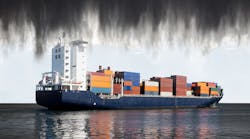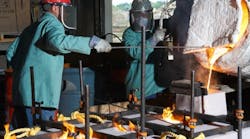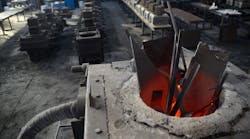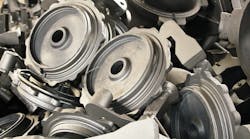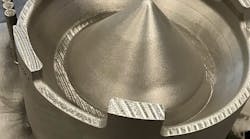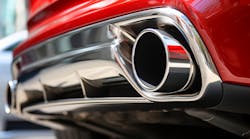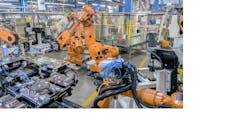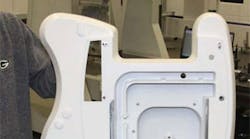To be a metalcaster now means always to be on lookout: always looking for a way to make castings more efficiently, or more productively. Always looking at what competitors are doing differently. Above all, it means always looking for new business, including new business from customers already in the order book, which means always looking for ways to give buyers something more than other suppliers propose to give them. Ultimately, being a metalcaster means being much more than simply a foundry or diecaster.
Watry Industries LLC in Sheboygan, WI, is a permanent mold aluminum foundry, but it’s also a heat-treater and precision machine shop, and it has powder coating and assembly operations, too.
The foundry’s processes center on six electric and 14 gas-fired furnaces capable supplying various standard and specialty aluminum alloys to dozens of casting machines of different designs — including a proprietary design with a universal mold mounting system that receives an almost unlimited range of mold sizes. The castings may weigh mere ounces up to more than 100 lb. Both the pouring and extraction processes are highly automated with robotics.
Watry is proud of the flexibility of its operation, as well of its ability to work with customers to develop and optimize casting design. Permanent mold casting is notable for its flexibility and design precision, which matters especially for some of Watry’s largest buyers: OEMs of medical equipment who order cast components to build things like anesthesia machines, ventilators, EKG carts, and other patient-care equipment.
The casting shown here is the base of an anesthesia machine, a component that houses the caster wheels and supports the weight of the unit, including large gas cylinders for some applications. To accomplish that, it must support substantial mechanical loads and meet the cosmetic expectations required of top-end medical devices: it has to resist scrapes and dents, and it must present a smooth, attractive, hygienic appearance.
From concept through tooling and into production, Watry worked closely with the manufacturer of this machine to improve the design, as well as the designs for two other castings that are part of the same supply program. Not incidentally, several alternative production processes were considered during the planning stage for this part, including plastic injection molding, structural foam, and plastic cowling over a steel fabrication. Other casting processes were studied, too, including sand casting and high-pressure diecasting.
After investigation, mechanical strength concerns eliminated some of the plastic construction methods and a thorough cost analysis eliminated the fabrication options as being too expensive. Aluminum castings have an established performance record for similar applications, and a cost analysis was done to compare the various casting processes. Based on the combination of part cost and tooling cost (total cost of ownership) the result of all these studies showed that permanent mold casting was the best process for the application.
Next, Watry’s casting design engineers participated in technical reviews of the part with the customer’s engineering group, using Magmasoft solidification modeling software (www.magmasoft.com) to analyze part and gating design, as well as to determine optimal process parameters. The Magmasoft analysis led to some design changes, which were incorporated into the part before the mold was built.
The joint engineering efforts resulted in an effective design and a quality cast product, which Watry Industries improved with heat treating, finish machining, and powder coating, all performed in-house. Now, Watry is applying the same methods to develop tooling for a similar but larger part, and expecting more success and customer satisfaction with a cost-effective follow-up program.
